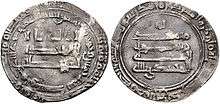Al-Muhtadi
| Al-Muhtadi المهتدي | |
|---|---|
 | |
| 14th Caliph of the Abbasid Caliphate | |
| Reign | 9 July 869 — 21 June 870 |
| Predecessor | al-Mu'tazz |
| Successor | al-Mu'tamid |
| Died | 21 June 870 |
| Dynasty | Abbasid |
| Father | al-Wathiq |
| Mother | Qurb |
| Religion | Islam |
Abū Isḥāq Muḥammad ibn al-Wāṯiq (died 21 June 870) , better known by his regnal name al-Muhtadī bi-'llāh (Arabic: المهتدي بالله, "Guided by God") was the Abbasid Caliph in Baghdad from 869 to 870, during the "Anarchy at Samarra".
Al-Muhtadi's mother was Qurb, a Greek slave.[1]
After the death of al-Mu'tazz, the Turks chose his cousin, al-Muhtadi as the new Caliph. Al-Muhtadi turned out to be firm and virtuous compared to the last few Caliphs. If he had come earlier, he might have restored life to the Caliphate; however, by now the Turks held more power.
Under him, the Court soon saw a transformation. Singing girls and musicians were expelled; justice was done daily in open court; wine and games were prohibited. He set Umar ibn Abd al-Aziz, the Umayyad Caliph, as his model and exemplar.
His reign, however, lasted less than a year. After some disagreements and conspiracies, he was killed by the Turks in 256 AH (June 870); he was thirty-eight then. The early Arab writers praise his justice and piety; and had he not been killed so soon, he could have been placed among the best of Abbasid Caliphs.
References
- ↑ Kennedy 2006, p. 173.
- This text is adapted from William Muir's public domain, The Caliphate: Its Rise, Decline, and Fall.
Sources
- Kennedy, Hugh N. (2004). The Prophet and the Age of the Caliphates: The Islamic Near East from the 6th to the 11th Century (Second ed.). Harlow, UK: Pearson Education Ltd. ISBN 0-582-40525-4.
- Kennedy, Hugh (2006). When Baghdad Ruled the Muslim World: The Rise and Fall of Islam's Greatest Dynasty. Cambridge, MA: Da Capo Press. ISBN 978-0-306814808.
| Al-Muhtadi Born: ? Died: 870 | ||
| Sunni Islam titles | ||
|---|---|---|
| Preceded by Al-Mu'tazz |
Caliph of Islam Abbasid Caliph 869 – 870 |
Succeeded by Al-Mu'tamid |